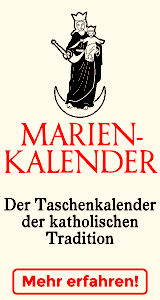 |
Loginoder neu registrieren? |
|||||
              
| ||||||
SucheSuchen Sie im kath.net Archiv in über 70000 Artikeln:     Top-15meist-diskutiert
|  Swiss Controversy on homilies by lay people15. Februar 2005 in English, keine Lesermeinung The "ad limina"-visit of the Swiss bishops took place from February 1 to 5. Main topics: faith situation in Switzerland, the shortage of priests and the issue of lay people in the service of the church. Switzerland(www.kath.net/rb) In these documents, the Swiss bishops allow for lay people giving homilies or meditations during Holy Mass, and they condemn the intercelebration of Catholic priests and Protestant ministers. According to the bishops' conference, the instruction "Redemptionis Sacramentum" has provoked various reactions, ranging from a warm welcome to a reluctant acceptance or even to rejection. The Swiss bishops point out that "the liturgical rules, which are brought to mind by the instruction are relevant, and they are a pillar for both the theology and the spirituality of the liturgy." "Being the celebration of the church, the liturgy primarily is a gift that cannot be arbitrarily disposed by each single responsible person. Just therefore the instruction can and should trigger a self-critical reflection of the own liturgical practice in Switzerland and if necessary be the impetus for appropriate improvements." Concerning ecumenical differences, the Swiss bishops state: "Unfortunately there are still obstacles on the path to the full unity of all Christians. Such barriers, however, may not be overcome by simplifications, playing down the seriousness of the open questions, as this is the case with intercelebrations of Catholic priests and Reformed ministers. In order to be able to celebrate the Eucharist of the Lord together sometime in the future, Catholics and Protestants must gather regularly and continue to pray with each other." In the first part of their document on "Laity in the Service of the Church", the Swiss bishops expound the theological arguments for the assignment of lay people in the church, and they appreciate their importance. The second part gives guidelines for pastoral assistants and their service in the proclamation of the gospel. Furthermore it lays down their responsibilities in the liturgy and as directors of parishes. 'Pro Ecclesia' and priests are surprised The Swiss Catholic lay organisation 'Pro Ecclesia' was surprised by the content and the timing of these documents, especially as the date of publication was just about two weeks before the "ad limina"-visit of the Swiss bishops. "The documents of the Swiss bishops' conference are surprising and worrying us, because they do not comply with the instructions of the magisterium". "Such a procedure appears to be a deliberate step to confront Rome with completed facts. Even more it contradicts the vow of obedience of the bishops to the Holy Father." The lay organisation was convinced that neither the Pope nor the concerned church authorities would grant Switzerland concessions, as these would put the unity of church at risk. A Swiss priest wrote in a kath.net article: "Our bishops are real world champions in blandishing crisis". He criticised that the bishops open a lengthy dialogue on liturgical abuses rather than calling their subordinates to obedience. The Swiss bishops state that "in some dioceses of Switzerland certain customs have developed that are not foreseen in the currently valid liturgical guidelines of the church universal." The priest remarks: "Our bishops state this in a way, as it would not affect their authority and responsibility as overseers of the local church." He concludes:"For me, as a priest, all this liturgical disobedience is really wearisome." Bishop Amédée Grab: Homilies by lay people are not allowed The "ad limina"-visit of the Swiss bishops took place from February 1 to 5. Main topics were the faith situation in Switzerland, the shortage of priests and the issue of lay people in the service of the church. Unfortunately the bishops could not visit Pope John Paul II, as he was in hospital, but they want to do that, as soon as possible. An excerpt from the document on "Laity in the Service of the Church": The wording "ordinarily" in the "General Instruction of the Roman Missal" implies that the homily may be given by another priest or by a deacon. This has been custom in our bigger parishes for a long time already. Therefore it seemed to be sort of self-evident that also pastoral assistants, men and women, were starting to preach during celebration of the Eucharist, as soon as several services could no longer be administered by ordained people. This does, however, not comply with Cannon Law. It is our special concern that the sermons on Sundays really proclaim the word of God, and that the faith of the church is expounded comprehensively into all spheres of daily life. Topic tables for sermons may be recommended in the view of a systematic catechesis of the fold, e.g. during lent; but they must always be related to the Sunday readings. Organisational arrangements must be made in due time, contacting the external celebrant, if necessary. We urgently ask all people concerned, not to make extensive use of our permissions, and not to deduce thereof a general authorisation to preach for pastoral assistants - a right to which they are not entitled to. By virtue of their consecration, priests and deacons are the primary proclamators of the gospel in the parishes. And they shall fulfil this task regularly." Compiled and translated by Reto Beeler. Ihnen hat der Artikel gefallen? Bitte helfen Sie kath.net und spenden Sie jetzt via Überweisung oder Kreditkarte/Paypal!  LesermeinungenUm selbst Kommentare verfassen zu können müssen Sie sich bitte einloggen. Für die Kommentiermöglichkeit von kath.net-Artikeln müssen Sie sich bei kathLogin registrieren. Die Kommentare werden von Moderatoren stichprobenartig überprüft und freigeschaltet. Ein Anrecht auf Freischaltung besteht nicht. Ein Kommentar ist auf 1000 Zeichen beschränkt. Die Kommentare geben nicht notwendigerweise die Meinung der Redaktion wieder. |  Mehr zuSchweiz
|       Top-15meist-gelesen
| |||
 | ||||||
© 2026 kath.net | Impressum | Datenschutz | ||||||
